Try as hard as you can, but it’s almost impossible to have a fun time anywhere these days. Last Saturday should have been a super fun day at the Palm Beach Book Festival. In my opinion, the Book Festival is the best thing going in Palm Beach during the season.
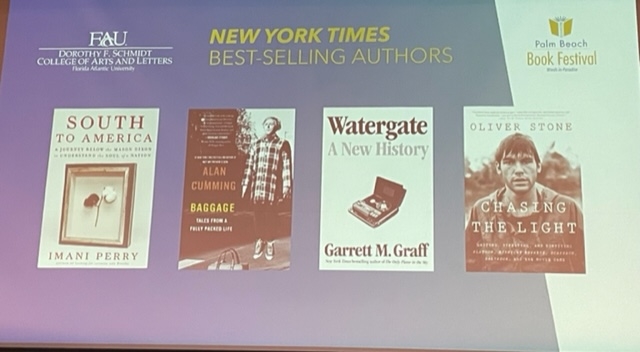
It’s an event that I look forward to every year. This year, it was an actual, in-person event for the first time in two years after Covid disrupted the last two gatherings. Lois Cahall, Festival founder and director lined up four fabulous New York Times bestselling authors with moderators. The theme was a fun one: History and Hollywood.
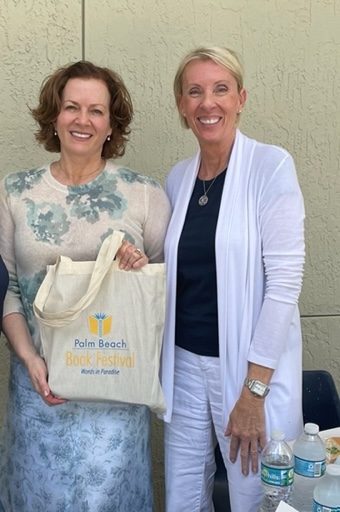
And, yet, there is no getting away from the facts, and they are no fun at all. In Florida where the Book Festival is located, the Governor is about to sign an anti-LGBTQ “Don’t Say Gay” bill into law; Republican legislatures and boards of education are banning any mention of racial inequality in school curricula, and almost all conversation is overshadowed by Putin’s pummeling of Ukraine.
So, naturally all four authors appearing at the eighth annual Palm Beach Book Festival circled back to the serious issues of the day in one way or another while entertaining an audience of avid readers.
Baggage
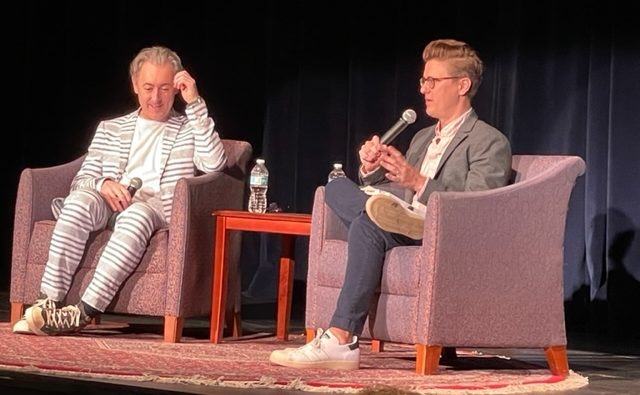
Alan Cumming is the Scottish stage and screen actor probably best known for his Broadway role of the Emcee in Cabaret. He has written several books including two childrens’ books and two memoirs including his most recent, Baggage.
Alan regaled the audience with tales about his stint in his first job as a journalist on a newspaper in Scotland, the Dundee Telegraph. “They put me in the “fiction” department — to write horoscopes. I was 16!”
Alan recollected how he, at least, knew his audience well enough not to write a horoscope saying, something like “you will be whisked off your feet by a prince, today,” and instead would caution: “Today, with Uranus in retrograde, is not a good day for cleaning out your closets.”
“Don’t Say Gay”
But, his distress was clear when he pivoted to the subject of a Florida “Don’t Say Gay” law which would ban any classroom reference to sexual orientation and gender identity from kindergarten through third grade in Florida schools.
“It’s horrifying, ” Alan said. “It’s like the time of Hitler. It’s very dangerous.” He cited statistics of gay children committing suicide, and added that Florida is lying about its motivations. “Florida says ‘Oh, it’s about all sexuality.’ But, it’s not. They allow talk about families with Mommies and Daddies, but not families where there might be two Daddies.That’s homophobic.”
An Archive Junkie
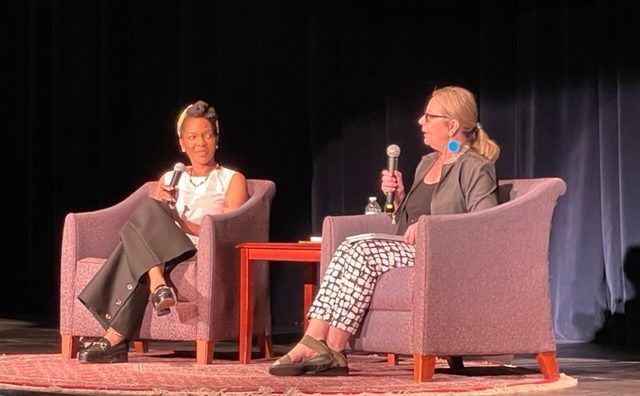
Another author who addressed a controversial subject for schools was Dr. Imani Perry. She’s a professor of African American Studies at Princeton University; the author of a number of award-winning, non-fiction books — and a native of Birmingham, Alabama.
She told the audience that for her latest book, South To America, among other things, she researched the archives of historic black newspapers. “I’m an archive junkie,” she said, “looking for stories of resilience, hope and beauty.”
She added: “We have to let go of the idea that there’s a simple narrative for the United States… My point is not to shift the narrative. I just want to be more honest… Multiculturalism exists all the way through our history.”
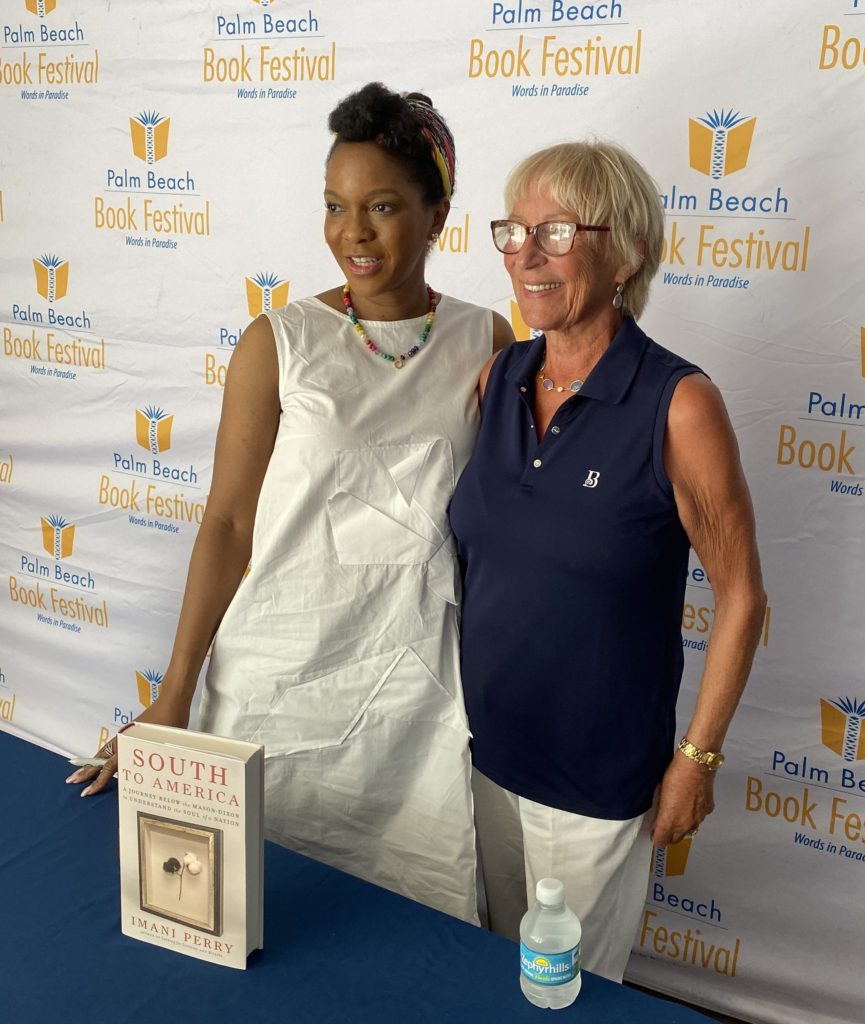
As for all the talk of “critical race theory” and banning it from school curricula, Dr. Perry said: “Not many people know exactly what critical race theory means. It’s actually a rarefied field of study which finds discriminatory practices in the context of anti-discrimination laws.
“In schools, it simply means we’re talking about racial inequality.” She disagrees with the view that it shouldn’t be taught because it’s distressing to white children. She views that as shortchanging children by stifling their imagination. By which, she means, that children are quite capable, if allowed, to imagine what it’s like to be different.
Yesteryear Conspiracies
Conspiracies were the theme for the afternoon author panels. Garrett Graff, a journalist and bestselling historian, enthralled the audience with his detailed accounts of the scandals of the Nixon presidency.
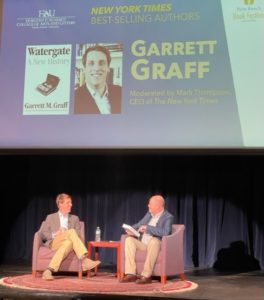
He said he wrote the 800-page tome, Watergate, A New History because “the Watergate story we think we know, isn’t that story.”
He added: “Donald Trump is named just once in the book, but that chapter (the Trump presidency) we just lived through looms over every page of this book. The creation of modern Washington leads back to Watergate.”
Garrett got some gasps (and some laughs) explaining how Nixon’s paranoia and fear that his enemies were conspiring to discredit him led to him installing a new voice-activated recording system in the Oval Office. It was that system that later produced the tapes that were evidence of Nixon’s role in the burglary of the Democratic National Committee offices in the Watergate. That ultimately led to his resignation.
JFK Revisited Again
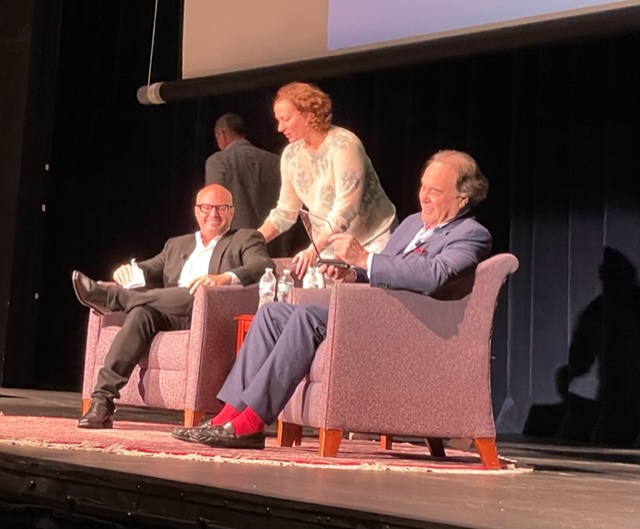
Oliver Stone, Oscar-winning writer and director who appeared as the last author of the day –wearing bright red socks– reinforced the idea that government is not to be trusted.
Referencing his Oscar-winning movie, Platoon, he agreed that Hollywood would probably not make that movie today. “It’s too much of a downer, and it showed how the U.S. government was telling lies, lies lies about the war.”
Stone referred to lies told about the U.S. soldiers that were killed by friendly fire; lies about the treatment of Vietnamese villagers and lies about the numbers of the dead.
Stone also criticized the mainstream media. He said that nothing has been written about his recent documentary on the JFK assassination, JFK Revisited: Through The Looking Glass. He has dug deep into that historical event, using declassified information.
The documentary, he said, focuses on a conspiracy between right-wing extremist groups –which he believes was behind the assassination– rather than lone gunman, Lee Harvey Oswald. However, he told the Book Festival audience that for more than 50 years the CIA has stonewalled requests for information.
“If Lee Harvey Oswald really was a lone gunman, why not release those files?” he asked rhetorically.
As for the war in Ukraine, Stone defended his recent Facebook posts where he referenced “Western double standards, including Kyiv and Zelenskyy’s bad behavior” and “Western media … omitting key facts when inconvenient.”
In the lengthy post, he referred to the “Ukrainian buildup of 110,000 soldiers on the Donetsk-Luhansk borders which was occurring essentially before the Russian buildup.” Stone did not elaborate on this at the Book Festival, adding only that, “Russia was pushed to the limits by NATO and the U.S.”
He made his anti-war views very clear however, and said he had “condemned” the Russian invasion of Ukraine.
His memoir, Chasing The Light, covers the first 40 years of his life. It chronicles his time as an infantryman in Vietnam to the highs and lows of working in Hollywood.
I will be writing more about these awesome books and their authors as I dive into them this summer.
Photo Credits: Cathy Helowicz.
If you enjoyed this report, please click the Like button. Thank you.